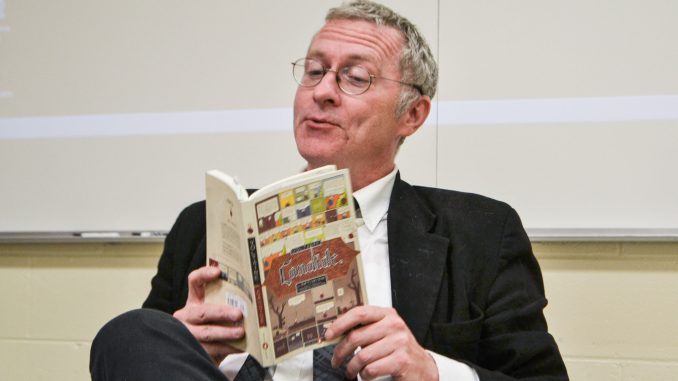
Dan Touey does not like change. He does not drive. He does not even have a driver’s license. He has woken up every day in Center City for 25 years.
An adjunct professor at Drexel, La Salle and Temple, Touey said he approaches his students not as an instructor but as a fellow student who is also learning. At Temple, he teaches Mosaic I in the Intellectual Heritage department.
“I’m not an expert on anything,” Touey said. “There were a lot of books I’m not familiar with, and I thought [we would all] get a good student experience from continued exposure to the subjects.”
Touey’s course has no assigned readings, no midterm and no final. The students don’t read at home unless they feel compelled to do so, which, Touey said, should be a self-compulsion, not the force of the teacher. Sitting with his students, Touey teaches five books throughout the semester, spending three weeks per book, which he reads aloud with his students.
“If we read together in class, we have a better chance at getting it into our minds,” Touey said. “It’s a very old-fashioned approach, like studying the Koran or the Talmud where you read together and just stop to have discussions or ask questions.”
Students are assigned two ungraded journals weekly and various four-page, or 1,000 word, essays to express their thoughts. Hoping to encourage students to “have a creative thought,” Touey said he doesn’t care if students miss a journal or exceed the word count.
These assignments are guidelines, and what Touey said he’s really looking for is a student who takes control of his or her learning.
“You don’t need me to spell it out to you,” Touey said.
This phrase, along with “just do it,” has come to characterize his challenge to students to believe enough in their own intellect and to not rely on their professor.
Another aspect of Touey’s methodology is humor. Teaching the Daodejing, Touey was stressing the importance of being natural and recognizing yourself as you are when one of his students realized that the subject applied most closely to his teacher.
“[This student had] only known me for a couple of weeks [and he said] ,‘You are yourself, you like to be funny and make people laugh,’” Touey said. “He was so right. He knew me.”
For Touey, humor in the classroom is “like oxygen.” When studying the Epic of Gilgamesh, one of Touey’s students retitled the story as the “Epic of Gilga-mess” due to the main character’s many flaws. Touey holds these natural and free flowing thoughts in high regard.
“In Mosaic where we’re reading these classic texts, it’s OK to make fun of them,” Touey said.
Inspiration for Touey’s teaching style comes from his early years at St. John’s College in Annapolis, Maryland. The small liberal arts school was entirely discussion based and didn’t offer majors, but encouraged students to focus on the classics: math, science and English. In addition to the coursework, what helped shape Touey’s approach to instruction was the mentality that the “teacher was only a very advanced student.”
Touey attended Temple for his master’s degree and while here he met distinguished scholar and philosophy professor, Joseph Margolis.
“[Margolis] had a humility and generosity of spirit,” Touey said. “He just wanted the students to be able to see the things he was seeing. The function of a teacher is to do that. That’s the only function.”
Teaching, however, has not always been that clear for Touey. In 2008 when Temple refashioned the IH curriculum as Mosaics, Touey was a primary dissenting voice.
He believed the change included too many advanced texts and not enough input from faculty. Touey used the IH listserv to voice his concerns, but was removed for “clogging” the system. He left the Mosaic department that year.
“I walked away [because] I didn’t think the course made any sense,” Touey said. “In 2008, I didn’t have faith in the course, but I kept in touch with one mosaic professor and, from talking to him and listening to what he was doing, he convinced me it was doable. [Nevertheless] it’s still very eccentric and poses real obstacles.”
Since returning, Touey has found that with the proper strategy in the classroom he can succeed. Relying on his understanding of the classics and the importance of questioning, something his father who is also a philosopher,taught him, Touey maintains that he can accomplish his goals by doing the books he teaches justice.
“If you’re reading something truly great like Plato or Shakespeare or the Koran or the Bible, nothing can really go terribly wrong,” Touey said. “The object then is just to do justice to the book for the students. If you can help them understand that book then you’ve done something for them, no questions.”
When not teaching and living the harried adjunct life rushing from school to school, Touey is working on a collection of short fiction stories, “The Fantastic Truths of the Real America.”
Touey said each work is an odd snapshot of contemporary America and he is thinking of self-publishing the collection as a Kindle book on Amazon for a dollar, if not for free.
Whether the story is finished or not, Touey said his goals for the next phase of his life are clear.
“I’m 48, and I told myself years ago that when I turned 50 I would move to Amsterdam and be a street musician … I see no reason to change that plan.”
Lora Strum can be reached at lora.strum@temple.edu


Be the first to comment